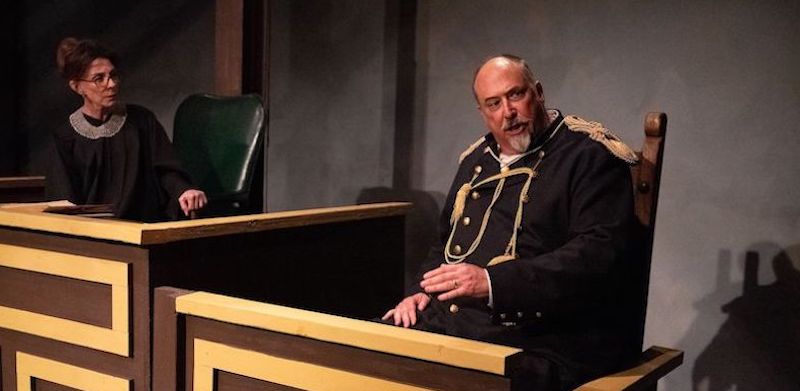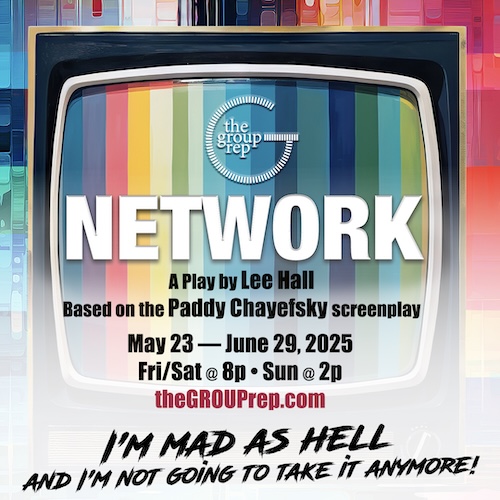
“In Whose Eyes?” Suzanne Ford and William Salyers (photo by Joey Lazano)
Reviewed by Steven Leigh Morris
Art of Acting Studio
Thru Oct. 28
RECOMMENDED
Two one-acts at the Art of Acting studio are produced by an independent company. The second on the bill, George Kappaz’s “In Whose Eyes?” is remarkable, first for its sheer eccentricity in taking on theological questions of mercy, forgiveness and the folly of judging awful behavior outside of its historical and wartime contexts. Furthermore, Kappaz takes a real risk in framing his courtroom trial play around idiosyncratic and little known characters from 19th century European and United States history. A question besides “in whose eyes?” might be “who should care?” Yet by play’s end, the drama has wormed its way toward resonant parallels between the horrors of genocide in 19th century south-eastern Europe (Italy and Austria), the United States (the genocide of North American native tribes), and 21st century horrors in Gaza, Lebanon and the West Bank.
Had Kappaz put contemporary global conflicts onto this stage, his play might have been too close for comfort, poking at deeply held emotional ties that render probing reflection so difficult. Rather, for Major Charles DeRudio (William Salyers) — an historically-based Italian aristocrat on trial here for genocide, among other war crimes (he attempted to assassinate Napolean III, led a brigade of Black American troops in the Union Army during the Civil War, and fought under General George Custer in a battle against Native tribes in which his brigade was routed) — Shakespearean questions of mercy and forgiveness slowly emerge from a distance of almost two centuries. In so doing, and among the play’s wisest attributes, Kappaz offers a somber caution against the ignorance and arrogance of overlaying contemporary, righteous moral certainties onto value systems of the past that may have been completely at odds with ours, even though, generations later, we occupy the same lands. Finally, there’s the haunting question of actions people are driven to take in war, as opposed to acceptable behaviors in a peacetime context. Soldiers are led to believe that they are defending something abstract — protecting “democracy,” or the “rights” of settlers (on the American plains and, by extension, in the West Bank of the River Jordan. Who are really the “savages” defending their homelands?
The plot concerns the war crimes trial of DeRudio, who, long deceased, now dwells in Purgatory, awaiting a verdict by Judge Peter (Suzanne Ford) — you get the idea —of whether his soul will burn in eternal flames, or be redeemed after sufficient atonement. He led a brigade that was actively battling racial bigotry in the U.S. For this, by modern standards, he gets points. That same Army participated in the decimation of Native tribes. For this, by our math, he loses points. If it were only so simple.
His defense attorney (Kirsta Peterson) annoys the Judge by pointing out Biblical passages (echoed in the Torah and the Koran) that invoke the righteous extermination of entire populations (Biblically called “hordes”), so the war-crimes-tribunal’s moral compass, placing pacifism as its North Star, is contradictory to those theological teachings, if not hypocritical. DeRudio was just following orders, as the saying goes. And those orders came from God. For that, his soul should burn in hell?
Playwright Kappaz puts in a strategically sanctimonious performance as the prosecuting attorney, Abbadon, sarcastically belittling every argument that casts both DeRudio and his younger self (Walter Rodriguez, finely impassioned) in a sympathetic light.
Elizabeth Ivy Southard turns in a persuasively sober cameo as DeRudio’s wife, who testifies on her husband’s behalf. Major DeRudio yearns for his late wife, but he’s barred from meeting her by the barrier between Heaven, where she resides, and Purgatory, where he wanders.
But the production’s anchors reside in Ford’s dignified and eloquent Judge Peter (whose patience is constantly tested). The conflicted, thoughtful Judge is a bit of a trope, but Ford handles it capably. The other anchor is Salyers’s pained and still tormented defendant, years after his death. Salyers brings a gravity and charisma to the role that may well tilt the affections of any jury in DeRudio’s favor.
In fact, at the performance I attended, in a brief, concluding moment of immersive goofing, the Judge asked the jury (the audience) for a hand-count of either a guilty or not-guilty verdict. The crowd, though not unanimous, was forgiving of the Major’s crimes — either an endorsement of the moral conundrums laid out by the playwright, or of Salyer’s efficacious performance. Who’s to know?
Johnny Patrick Yoder stages an absorbing production, despite the fleeting commonplaces of Kappaz’s courtroom verbiage (“badgering the witness” “objection” “overruled”) in a court that’s clearly not in our sphere. At one point, prosecutor Abbadan dismisses the witness, which would seem to fall in the purview of the Judge not the attorney. These are quibbles.
Carra Yoder’s 19th century costumes include DeRudio in his now slightly tattered green Army Major uniform with ornamental aiguillettes. The Judge’s black robe is set off by an embroidered, white neck collar bespeaking Colonial America.
Oscar Garcia’s Scenic Design places a courtroom’s artifice inside the small theater, with shifting projected backdrops, ranging from locales and the actual historical people being portrayed, to cloud formations, lending an essential cosmic touch.
For the bill’s opener, writer-director Richard Gustin’s “Someone Like Me” is a meet-cute two-hander set in a coffee shop and featuring a young woman, Jordan (Bianca Foscht), engaged to be married; and an interloper named Blake (Marcus Wells), who comes on to her. Without knowing her, he asks her out, asks if she’s “committed,” and won’t leave, despite her dismay at him being so forward. She is, after all, trying to mind her own business, while he is trying to mine hers. Furthermore, as she points out, he is rudely assertive and then apologetic for being so rude and assertive — as though trying to charm her by his introspection.
Stunningly, she is charmed by something about him, given that she doesn’t flee, call the cops, or start screaming, all of which would seem viable options. This speaks either to her courtesy, her vacuousness or to her jitters, given her expressed annoyance at her fiancé’s slovenliness and self-absorption. This begs the question, what kind of person unloads about her fiancé, and unloads to a smarmy stranger who is clearly hitting on her and exploiting her every vulnerability in the name of caring? And who is he to care on that level? It’s not like she just broke an ankle or is having trouble breathing? She’s having pre-nuptial panic, which he transparently exploits for his own ends, presumably nefarious. To the casual onlooker, this is obvious, too obvious.
I suppose the central question, despite Foscht’s tenderly and convincingly irritated performance, is how she could be so gullible? She is clearly not charmed by his ceaseless apologies because she barks at him about precisely that. So, in fact, she is not stupid. Then what exactly about him is she charmed by, given Wells’ snake-oil salesman portrayal? It’s like being charmed by fly that won’t leave. Is this just rebound syndrome that’s setting in before her wedding? I simply couldn’t make sense of her.
The play does end with a cosmic note, which I won’t reveal.
Art of Acting Studio, 1017 N. Orange Dr., Hlywd.; Thurs.-Sat., 7:30 pm; Sun., 6:30 pm; thru Oct. 27. https://bit.ly/46rK807 Two hours, including intermission











